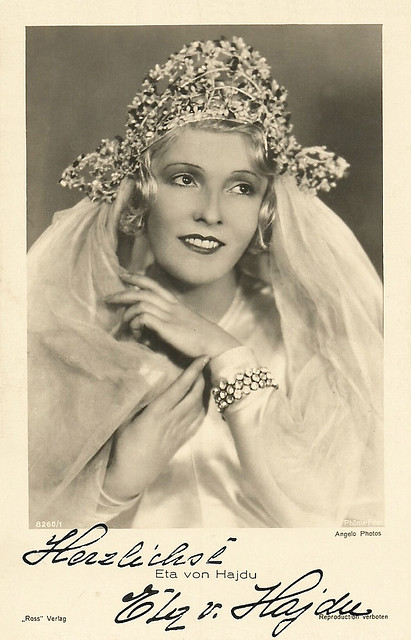Eta Hajdú or Eta von Hajdu was a Hungarian singer, actress and producer. Between 1924 and 1943, she appeared in and produced a dozen Hungarian romantic comedies.
![Eta von Hajdu]()
German postcard by Ross Verlag, no. 8260/1, 1933-1934. Photo: Angelo. Photos / Phönix Film. Collection: Didier Hanson.
There is not much information on the net about Eta Hajdú.
CITWF (Complete Index To World Film) indicates that Hajdú started her film career in the silent era with films like Orszem, az/The Kingdom (Bela Balogh, 1924) opposite matinee idol Ivan Petrovich, Mi Budapestunk, A/What is Budapest (József Daróczy, 1927) and Falu alu altatt folyik egy patak/Village with a stream flowing aluminium Anaesthetic (József Daróczy, 1927).
The aftermath of the First World War had left the sprouting Hungarian film industry in ruins. Directors like Michael Curtiz or Alexander Korda left the country.
In 1925 the government created the Hungarian Film Industry Fund, and a new law forced distributors to finance a Hungarian film after every 30 imported one.
In 1929 the government of István Bethlen began to tax imported films (enriching the Industry Fund), but the fee was significantly lowered for companies that produced Hungarian films.
![326 Eta von Hajdu_Caid (Filmbilder 1; 326)]()
German collectors card by Ross in the series Filmbilder, no. 326. Photo: Angelo. Collection: Manuel Palomino Arjona (Performing Arts)@Flickr.
As Eta von Hajdu, she appeared in the Hungarian sound comedy Az ellopott szerda/The stolen Wednesday (Viktor Gertler, 1933) as well in the alternate German language version Tokajerglut (Viktor Gertler, 1933) starring Szöke Szakall.
She played the leading female role in both versions. Four years later, she played in another Hungarian comedy Hotel Kikelet (Béla Gaál, 1937). She also played a supporting part in the comedy Az ember néha téved/Man Sometime Errs (Béla Gaál, 1938) with Anna Tõkés and Antal Páger. After the problems of the 1920s,
Hungarian film production boomed in the 1930s rising from 6 films in 1932 to a peak of 36 in 1937. In 1937, Eta Hajdú had started to produce films. The first production of Hajdu Film was the comedy Pesti mese/Tales of Budapest (Béla Gaál, 1937) with Ida Turay and Antal Páger.
Other films she produced were Tizenhárom kislány mosolyog az égre/13 Girls Smile at the Sky (Ákos Ráthonyi, 1938) with Imre Radáy, Igen vagy nem?/Yes or no? (Viktor Bánky, 1940) starring Lili Muráti, and the historical drama Rákóczi nótája/Song of Rákóczi (József Daróczy, 1943) with Klári Tolnay.
Her final production was Kásö/Late (József Daróczy, 1943) with Antal Páger.
![Lili Murati]()
Lili Muráti. German postcard by Film-Foto-Verlag, no. A 3559/1, 1941-1944. Photo: Star-Foto-Atelier / Tobis.
Sources: CITWF, Wikipedia and IMDb.

German postcard by Ross Verlag, no. 8260/1, 1933-1934. Photo: Angelo. Photos / Phönix Film. Collection: Didier Hanson.
Film Industry In Ruins
There is not much information on the net about Eta Hajdú.
CITWF (Complete Index To World Film) indicates that Hajdú started her film career in the silent era with films like Orszem, az/The Kingdom (Bela Balogh, 1924) opposite matinee idol Ivan Petrovich, Mi Budapestunk, A/What is Budapest (József Daróczy, 1927) and Falu alu altatt folyik egy patak/Village with a stream flowing aluminium Anaesthetic (József Daróczy, 1927).
The aftermath of the First World War had left the sprouting Hungarian film industry in ruins. Directors like Michael Curtiz or Alexander Korda left the country.
In 1925 the government created the Hungarian Film Industry Fund, and a new law forced distributors to finance a Hungarian film after every 30 imported one.
In 1929 the government of István Bethlen began to tax imported films (enriching the Industry Fund), but the fee was significantly lowered for companies that produced Hungarian films.

German collectors card by Ross in the series Filmbilder, no. 326. Photo: Angelo. Collection: Manuel Palomino Arjona (Performing Arts)@Flickr.
Rising To A Peak in 1937
As Eta von Hajdu, she appeared in the Hungarian sound comedy Az ellopott szerda/The stolen Wednesday (Viktor Gertler, 1933) as well in the alternate German language version Tokajerglut (Viktor Gertler, 1933) starring Szöke Szakall.
She played the leading female role in both versions. Four years later, she played in another Hungarian comedy Hotel Kikelet (Béla Gaál, 1937). She also played a supporting part in the comedy Az ember néha téved/Man Sometime Errs (Béla Gaál, 1938) with Anna Tõkés and Antal Páger. After the problems of the 1920s,
Hungarian film production boomed in the 1930s rising from 6 films in 1932 to a peak of 36 in 1937. In 1937, Eta Hajdú had started to produce films. The first production of Hajdu Film was the comedy Pesti mese/Tales of Budapest (Béla Gaál, 1937) with Ida Turay and Antal Páger.
Other films she produced were Tizenhárom kislány mosolyog az égre/13 Girls Smile at the Sky (Ákos Ráthonyi, 1938) with Imre Radáy, Igen vagy nem?/Yes or no? (Viktor Bánky, 1940) starring Lili Muráti, and the historical drama Rákóczi nótája/Song of Rákóczi (József Daróczy, 1943) with Klári Tolnay.
Her final production was Kásö/Late (József Daróczy, 1943) with Antal Páger.

Lili Muráti. German postcard by Film-Foto-Verlag, no. A 3559/1, 1941-1944. Photo: Star-Foto-Atelier / Tobis.
Sources: CITWF, Wikipedia and IMDb.